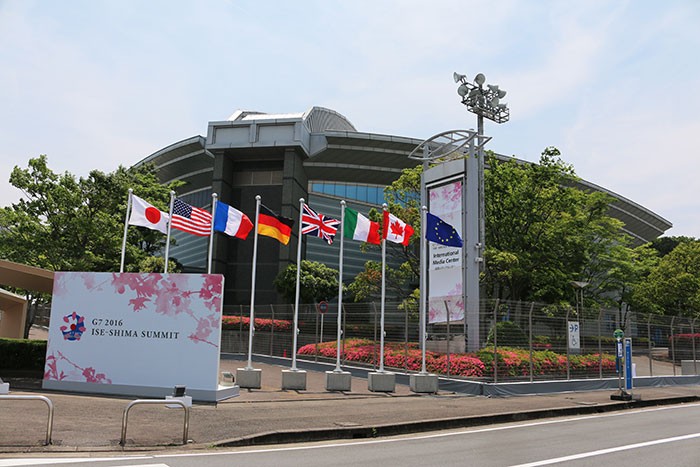Media Report

- Bloomberg Business reports: "World leaders meet in Japan this week for talks that will encompass the slowing Chinese economy and China's reclamation of land in the disputed South China Sea -- without any representatives from Asia's largest economy at the table....China reacted with anger to an April statement by G-7 foreign ministers expressing opposition to any 'intimidating, coercive or provocative' actions in the East China Sea and South China Sea, and calling on all parties to act in accordance with international law....A similar declaration by the leaders this week would further irritate China, a key trading partner for all the G-7 members."
- Reuters reports: "Vietnam Prime Minister Nguyen Xuan Phuc said on Wednesday his country was not pursuing a military buildup over the South China Sea and would work with allies to seek peaceful solutions to disputes, with no use of force. Speaking in a rare interview with some foreign journalists after a visit by U.S. President Barack Obama, Phuc said the South China Sea dynamic had grown in complexity and needed regional friends and strategic partners to ensure harmony and avoid any disruption to maritime trade....Phuc made no reference to China during the interview and it was unclear what he meant when he used the word 'justice' as a means of preserving Vietnam's sovereignty claims."
- The Financial Times reports: "Beijing is encouraging foreign companies to co-invest with Chinese contractors in third countries, a strategy that could help keep manufacturing jobs and investment in China even as its own economic growth slows....The possibility of co-investment offers a foothold for foreign investors in Xi Jinping's 'One Belt, One Road' policy initiative, a programme to promote Chinese investment in trading partners and address the thorny problem of industrial overcapacity at home....'Chinese companies alone do not necessarily have enough capital or experience to carry out [all the investments] in the Belt and Road countries,' said Zhao Kejin, an expert on China's foreign policy and diplomacy at the Carnegie-Tsinghua Center for Global Policy. 'Especially in Central Asia, the Middle East and northern Africa, European companies have more experience, better technology and good social relations while Chinese companies have the money. Together, they can make things happen.'"
Calendar
- 2016-05-24 Don’t start a fire in Asia, China warns Obama after Vietnam arms embargo lifted
- 2016-05-23 China plans base station for rescue operations in South China Sea
- 2016-05-22 US wields biggest stick in trade dumping fight
- 2016-05-20 Taiwan President Takes Cautious Line on China at Inauguration
- 2016-05-19 China, Denying Close Encounter With American Plane, Points Finger at U.S.
- 2016-05-18 China criticizes US steel anti-dumping measures
- 2016-05-17 Top ranked Chinese official to 'listen' to HK demands as independence calls grow
- 2016-05-16 China Housing Revival Buffers Economy
- 2016-05-15 Maoists Still a Force 50 Years After the Cultural Revolution
- 2016-05-13 Apple invests $1 billion in Chinese ride-hailing service Didi Chuxing
News
- Bloomberg Business On the Agenda But Off Guest List, China Eyes G-7 in Japan
- Reuters New Vietnam PM says won't pursue military buildup in South China Sea
- The Financial Times China seeks foreign investors for One Belt, One Road push
- CBS News Why Obama's Asia trip is not playing well in China
- CNN Daughter of Hong Kong bookseller: Don't let China get away with illegal abductions
- The Guardian David Cameron: China must abide by ruling on South China Sea
- The Washington Post China's Wanda prepares for battle with 'old brand'
- The New York Times China's Leader Wears Many Hats, but Only One Jacket
- The Financial Times Cameron adds to pressure on China over maritime disputes
- Bloomberg Business China Said to Plan Asking U.S. on Timing of Fed Rate Hike
- The New York Times Inquiry Highlights Terry McAuliffe's Ties to Chinese Company
- The Washington Post Renowned Chinese writer Yang Jiang dies at age 104
- Reuters Taiwan says it has no schedule for resuming China trade talks
Commentary
- The New York Times: Sinosphere Chinese Military Official Denounces Taiwan's President for Being Unmarried
- The Wall Street Journal: China Real Time Chinese Official Says Taiwan's President is 'Extreme' Because She's Unmarried
- Foreign Policy: ChinaFile Is China on a Path to Debt Ruin?
- The National Interest Should Duterte Step Back on the South China Sea?
- The New York Times: Sinosphere China's Craft Breweries Find They May Have a 5,000-Year-Old Relative
- The Wall Street Journal: China Real Time China's New Law on International NGOs – And Questions about Legal Reform
- The Diplomat Is China a Global Force for Good?
